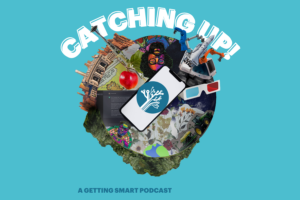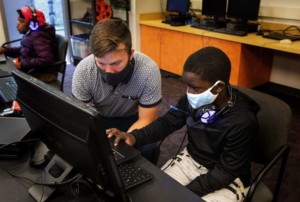Why States Should Require Online Learning

Question: What do algebra and online learning have in common?
Answer: Most kids would not experience either if not required.
Graduation requirements translate society’s expectations to the young. It’s our collective best guess at the knowledge and skills they will need to participate in the society they will inherit. If we did not require algebra, not many students would take it. Low-income, minority, and struggling students would be steered away from advanced math. Setting minimum education requirements promotes equity and participation.
All high school students should take at least one course online while in high school according to Digital Learning Now!, the state policy project co-chaired by former governors Jeb Bush and Bob Wise. This recommendation, and all 10 Elements of High Quality Digital Learning, resulted from the vigorous discourse of 100 experts.
The recommendation is based on the fact that nearly all young people will learn online after high school, whether it’s in college, corporate, or military training. Online and blended learning is rapidly becoming the dominant mode of formal and informal post-secondary learning. High school is a great place to discover learning online.
I’d go a step further and strongly encourage every high school student to take at least one online course each year. The requirement would cost-effectively expand options for students. Every high school student should have access to every Advanced Placement® (AP) course, foreign language course, advanced STEM courses, and dual enrollment courses. Making online learning a graduation requirement would accelerate access to these courses and expand opportunities for our highest-achieving students.
The requirement would also benefit struggling students by creating to good teachers and quality content (see the story about the Utah students that switched to Open High to gain access to a great English teacher).
Online learning is growing by almost 50 percent, and more than one million students are taking online courses on a part-time basis where states and districts make them available. Some of this will take care of itself over time as barriers are reduced and access is improved, but in the meantime, it will leave millions of young people not as well-prepared as they should be. Promoting the graduation requirement is, to some extent, an effort to bring up the rear in states slow to create options for students.
Alabama, Florida, and Michigan require students to take at least one course online in order to graduate. Idaho requires two. New Mexico requires a dual enrollment, AP, or online course. Legislation in Georgia (SB 289) and Indiana (SB 179) would add one high school course to graduation requirements.
More broadly on the digital learning front, the Kentucky chief will recommend digital learning legislation in February. The Ohio Digital Learning Task Force will make recommendations in March. Plans to advance digital learning are underway in at least 15 more states.
Taking an online course in high school is a learning experience in the digital age that will prepare students for online learning in college or career where the stakes for success are much higher. A student who learns the study habits, mechanics, and skills of learning online — using learning management systems, social platforms, email, Web conferencing, and other rapidly growing tools in online courses — will be better equipped for life after graduation.
For more See Digital Learning Now Element #2 Video.
This blog first appeared on The Huffington Post.








Charlie Mas
Ha! Good one.
Here's another: What's the difference between boogers and brocolli?
Kids won't eat brocolli.
No kidding, it's a good recommendation. There are a lot of schools that now have a required AP class, such as AP Human Geography. Learning how to learn online is going to be a necessary skill and so should be part of preparing our students for career, college and life. It's also a critical element of preparing them to be lifetime learners.
More than that, it will help to create the critical mass of subscribers needed to support the fledgling industry. It would provide not only enough support to get one or two providers off the ground, but, much better than that, it would provide the support needed to create a competitive marketplace.
A fine idea.
Leonard V.
States should (not actually require) but open opportunities for e learning training courses. This helps many individuals in distance places take their needed courses or training or certification and have an opportunity for a decent job.
Replies
Tom Vander Ark
Two reasons I advocate for requirement
1) almost all young adults will learn online in post-secondary setting
2) makes all districts introduce some high school options
Jennifer G.
You were right on with this article! In the last few years, online learning has grown by leaps and bounds, at least in the schools in my area (CA). Unfortunately though, it seems students only have the option to switch to "fully online" vs. having the option to take some courses in person and others online. Schools are implementing more online classwork and homework though, using Google Docs and other online resources, which I think is beneficial. I still think a good mix of both online and in-person education is needed to create well-rounded students and people.
Replies
Tom Vander Ark
Thanks Jennifer, we agree that for most students a blended environment is best but with access to a variety of online courses. Our friends at ExcelinEd call that Course Access, here's two relevant posts
1. Why Students in My Schools Can Test Drive Careers, Dr. Patrice Pujol, Ascension Parish
http://www.gettingsmart.com/gettingsmart-staging/2015/12/students-schools-can-test-drive-careers/
2. Course Access: Reimagining What’s Possible for Education
http://www.gettingsmart.com/gettingsmart-staging/2015/11/course-access-reimagining-whats-possible-for-education/